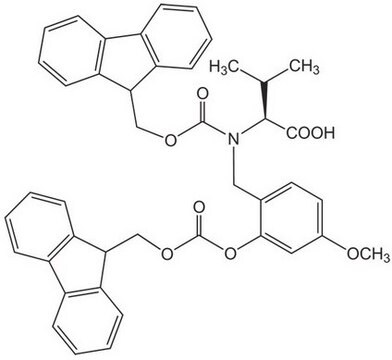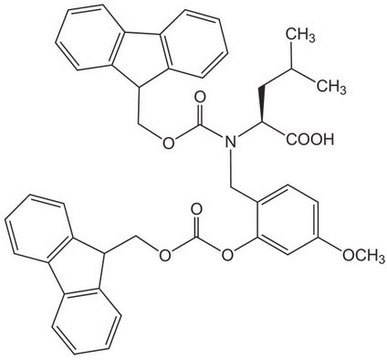おすすめの製品
品質水準
製品種目
Novabiochem®
アッセイ
≥85.0% (acidimetric)
≥97.0% (HPLC)
フォーム
powder
反応適合性
reaction type: Fmoc solid-phase peptide synthesis
メーカー/製品名
Novabiochem®
アプリケーション
peptide synthesis
官能基
Fmoc
保管温度
2-8°C
関連するカテゴリー
詳細
Hmb protection of amide bonds has been shown to inhibit aggregation of "difficult" peptides during Fmoc SPPS, thereby leading to products of increased purity [1,2,3,4,5,6]. Retention of Hmb groups on the cleaved peptide can greatly improve the solubility of protected peptide fragments [7,8] and otherwise intractable sequences [9,10,11]. Furthermore, using a Hmb-protected derivative for incorporation of the residue linked to the carboxyl group of Asp or Asn residues has been found to suppress formation of aspartimide and piperidide related by-products [12,13,14]. For a comparison of the efficiency of Hmb and pseudoprolines in preventing aggregation, see [15].
Associated Protocols and Technical Articles
Cleavage and Deprotection Protocols for Fmoc SPPS
Literature references
[1] T. Johnson, et al. (1993) J. Chem. Soc., Chem. Commun., 369.
[2] C. Hyde, et al. (1994) Int. J. Peptide Protein Res., 43, 431.
[3] L. C. Packman, et al. (1994) Pept. Res., 7, 125.
[4] T. Johnson, et al. (1994) Tetrahedron Lett., 35, 463.
[5] R. G. Simmonds (1996) Int. J. Peptide Protein Res., 47, 36.
[6] T. Johnson, et al. (1995) Lett. Pept. Sci., 1, 11.
[7] M. Quibell, et al. (1995) J. Am. Chem. Soc., 117, 11656.
[8] M. Quibell, et al. (1996) J. Chem. Soc., Perkin Trans. 1, 1227.
[9] M. Quibell, et al. (1994) Tetrahedron Lett., 35, 2237.
[10] M. Quibell, et al. (1994) J. Org. Chem., 59, 1745.
[11] M. Quibell, et al. (1995) J. Chem. Soc., Perkin Trans. 1, 2019.
[12] M. Quibell, et al. (1994) J. Chem. Soc., Chem. Commun., 2343.
[13] L. C. Packman (1995) Tetrahedron Lett., 36, 7523.
[14] J. Offer, et al. (1996) J. Chem. Soc., Perkin Trans. 1, 175.
[15] W. R. Sampson, et al. (1999) J. Peptide Sci., 5, 403.
Associated Protocols and Technical Articles
Cleavage and Deprotection Protocols for Fmoc SPPS
Literature references
[1] T. Johnson, et al. (1993) J. Chem. Soc., Chem. Commun., 369.
[2] C. Hyde, et al. (1994) Int. J. Peptide Protein Res., 43, 431.
[3] L. C. Packman, et al. (1994) Pept. Res., 7, 125.
[4] T. Johnson, et al. (1994) Tetrahedron Lett., 35, 463.
[5] R. G. Simmonds (1996) Int. J. Peptide Protein Res., 47, 36.
[6] T. Johnson, et al. (1995) Lett. Pept. Sci., 1, 11.
[7] M. Quibell, et al. (1995) J. Am. Chem. Soc., 117, 11656.
[8] M. Quibell, et al. (1996) J. Chem. Soc., Perkin Trans. 1, 1227.
[9] M. Quibell, et al. (1994) Tetrahedron Lett., 35, 2237.
[10] M. Quibell, et al. (1994) J. Org. Chem., 59, 1745.
[11] M. Quibell, et al. (1995) J. Chem. Soc., Perkin Trans. 1, 2019.
[12] M. Quibell, et al. (1994) J. Chem. Soc., Chem. Commun., 2343.
[13] L. C. Packman (1995) Tetrahedron Lett., 36, 7523.
[14] J. Offer, et al. (1996) J. Chem. Soc., Perkin Trans. 1, 175.
[15] W. R. Sampson, et al. (1999) J. Peptide Sci., 5, 403.
関連事項
Replaces: 04-12-1187
アナリシスノート
Color (visual): white to slight yellow to beige
Appearance of substance (visual): powder
Identity (IR): passes test
Enantiomeric purity: ≥ 99.0 % (a/a)
Purity (TLC(157A)): ≥ 95 %
Purity (TLC(157B)): ≥ 95 %
Assay (HPLC, area%): ≥ 97.0 % (a/a)
Solubility (1 mmole in 2 ml DMF): clearly soluble
Assay (acidimetric): ≥ 85.0 %
Water (K. F.): ≤ 1.00 %
To see the solvent systems used for TLC of Novabiochem® products please click here.
Appearance of substance (visual): powder
Identity (IR): passes test
Enantiomeric purity: ≥ 99.0 % (a/a)
Purity (TLC(157A)): ≥ 95 %
Purity (TLC(157B)): ≥ 95 %
Assay (HPLC, area%): ≥ 97.0 % (a/a)
Solubility (1 mmole in 2 ml DMF): clearly soluble
Assay (acidimetric): ≥ 85.0 %
Water (K. F.): ≤ 1.00 %
To see the solvent systems used for TLC of Novabiochem® products please click here.
法的情報
Novabiochem is a registered trademark of Merck KGaA, Darmstadt, Germany
保管分類コード
11 - Combustible Solids
WGK
WGK 2
引火点(°F)
Not applicable
引火点(℃)
Not applicable
試験成績書(COA)
製品のロット番号・バッチ番号を入力して、試験成績書(COA) を検索できます。ロット番号・バッチ番号は、製品ラベルに「Lot」または「Batch」に続いて記載されています。
プロトコル
The ease of assembly of a given peptide sequence is hard to predict, which makes peptide synthesis challenging. Review methods and reagents for avoiding aggregation in solid-phase peptide synthesis.
ライフサイエンス、有機合成、材料科学、クロマトグラフィー、分析など、あらゆる分野の研究に経験のあるメンバーがおります。.
製品に関するお問い合わせはこちら(テクニカルサービス)








